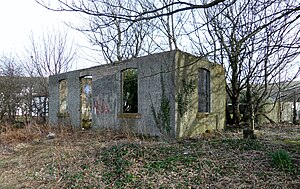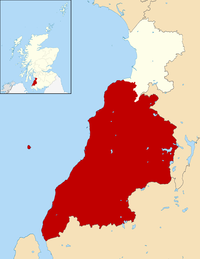Girvan (Old) railway station
Girvan Old Girvan, Girvan Goods | |
|---|---|
 Site of Girvan Old railway station | |
| General information | |
| Location | Terminus of original line Scotland |
| Coordinates | 55°14′48″N 4°51′17″W / 55.246554°N 4.8546810°W |
| Grid reference | NX 18596 98367 |
| Platforms | 1 |
| Other information | |
| Status | Disused |
| History | |
| Original company | Maybole and Girvan Railway |
| Pre-grouping | Glasgow and South-Western Railway |
| Post-grouping | London, Midland and Scottish Railway |
| Key dates | |
| 24 May 1860[1] | Opened |
| 5 October 1877 | Renamed[2] |
| 1 April 1893 | Closed[3] |
Girvan Old railway station was a terminus station opened in Girvan, in Carrick, South Ayrshire, Scotland by the Maybole and Girvan Railway. Although ambitions existed to extend the line through to Stranraer it was built on a site that would not permit this and so when the line was built the Girvan New station was opened on 5 October 1877 by the Girvan and Portpatrick Junction Railway on the route to Pinmore and eventually through to Stranraer railway station.[4]
History
[edit]
The original Girvan terminus station was situated adjacent to the goods station that was established at the site. It was opened by the Maybole and Girvan Railway with only one short platform in 1860 and was retained as a goods station in 1877 by the Glasgow and South Western Railway who took over the running of the line to Stranraer. The Girvan New station was further from the town and this was not popular with passengers and it appears that trains called at either station for a short period of time. Girvan Old Station closed to regular passenger traffic on 1 April 1893 and the goods station remained in use.[5] Another source states that Girvan New station at first only catered for the workings continuing south to Stranraer.
The remnants of the old station platform were still present in 1988 and were even visible in 2017 many years after the track was lifted.[6]
Station and goods station infrastructure
[edit]
Girvan Old had a single platform. The goods station had a number of buildings including a turntable, water column, weighing machines, engine shed that closed in 1940[7] and a coal yard with a bridge over the River Girvan that led to the harbour and jetty.[8][9] The track was still in situ in 1989 however it had been lifted by 2014.[10] The old Girvan terminus went out of use in the 1980s due to the poor condition of the wooden bridge over the River Girvan although ballast trains were still making use of the site.[11]
Harbour branch
[edit]The Glasgow and South-Western Railway built a line to the harbour from the goods station that involved a second bridge over the River Girvan and at the harbour jetty coal was emptied down a chute into waiting colliers that took the coal to Ireland. A network of sidings and two waggon turntables existed here.[12] This arrangement only lasted until 1918 with coal coming from the Bargany Pit.[13][14]
Maybole and Girvan Railway | |||||||||||||||||||||||||||||||||||||||||||||||||||||||||||||||||||||||||||||||||||||||||||||||||||||||||||||||||||||||
|---|---|---|---|---|---|---|---|---|---|---|---|---|---|---|---|---|---|---|---|---|---|---|---|---|---|---|---|---|---|---|---|---|---|---|---|---|---|---|---|---|---|---|---|---|---|---|---|---|---|---|---|---|---|---|---|---|---|---|---|---|---|---|---|---|---|---|---|---|---|---|---|---|---|---|---|---|---|---|---|---|---|---|---|---|---|---|---|---|---|---|---|---|---|---|---|---|---|---|---|---|---|---|---|---|---|---|---|---|---|---|---|---|---|---|---|---|---|---|---|
| |||||||||||||||||||||||||||||||||||||||||||||||||||||||||||||||||||||||||||||||||||||||||||||||||||||||||||||||||||||||
| Preceding station | Following station | |||
|---|---|---|---|---|
| Historical railways | ||||
| Killochan | Glasgow and South Western Railway Maybole and Girvan Railway |
Terminus | ||
References
[edit]Notes
[edit]- ^ Butt (1995). The Directory of Railway Stations: details every public and private passenger station, halt, platform and stopping place, past and present. p. 103.
- ^ Butt (1995). The Directory of Railway Stations: details every public and private passenger station, halt, platform and stopping place, past and present. p. 103.
- ^ Butt (1995). The Directory of Railway Stations: details every public and private passenger station, halt, platform and stopping place, past and present. p. 103.
- ^ Butt (1995). The Directory of Railway Stations: details every public and private passenger station, halt, platform and stopping place, past and present. p. 103.
- ^ "Canmore". RCAHMS. Retrieved 3 March 2017.
- ^ "A History of Britain's Railways". RailScot. Retrieved 3 March 2017.
- ^ Wham (2013). Ayrshire's Forgotten Railways. A Walker's Guide. p. 71.
- ^ "Ayrshire 055.04 (includes: Girvan). Publication date: 1896. Revised: 1894". Ordnance Survey. Retrieved 3 March 2017.
- ^ "Canmore". RCAHMS. Retrieved 3 March 2017.
- ^ "A History of Britain's Railways". RailScot. Retrieved 3 March 2017.
- ^ "Ayrshire 055.04 (includes: Girvan). Publication date: 1896. Revised: 1894". Ordnance Survey. Retrieved 3 March 2017.
- ^ "Ayrshire 055.04 (includes: Girvan). Publication date: 1896. Revised: 1894". Ordnance Survey. Retrieved 3 March 2017.
- ^ Wham (2013). Ayrshire's Forgotten Railways. A Walker's Guide. p. 71.
- ^ "Ayrshire 055.04 (includes: Girvan). Publication date: 1896. Revised: 1894". Ordnance Survey. Retrieved 3 March 2017.
Sources
[edit]- Butt, R. V. J. (1995). The Directory of Railway Stations: details every public and private passenger station, halt, platform and stopping place, past and present (1st ed.). Sparkford: Patrick Stephens Ltd. ISBN 978-1-85260-508-7.
- Jowett, Alan (March 1989). Jowett's Railway Atlas of Great Britain and Ireland: From Pre-Grouping to the Present Day (1st ed.). Sparkford: Patrick Stephens Ltd. ISBN 978-1-85260-086-0. OCLC 22311137.
- Wham, Alasdair (2013). Ayrshire's Forgotten Railways. A Walker's Guide. Usk : Oakwood Press. ISBN 978-0-85361-729-7.

